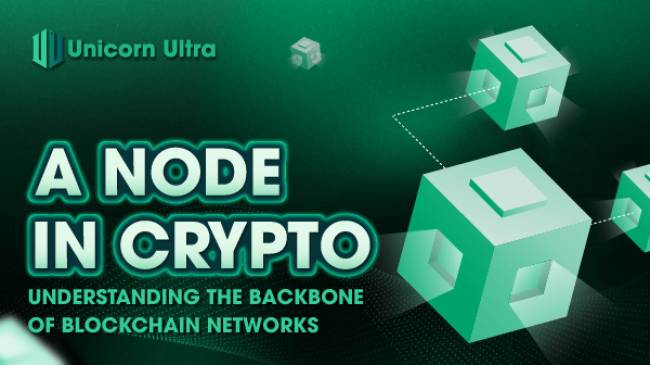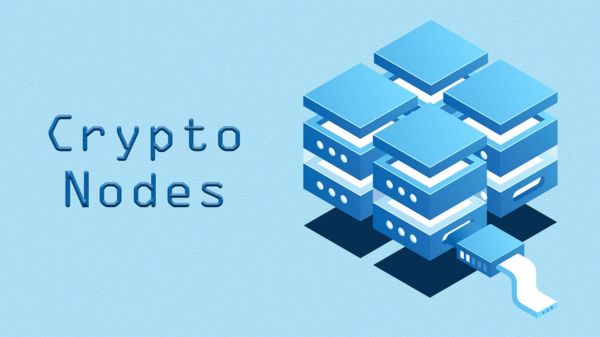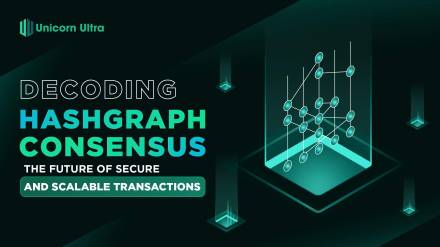Cryptocurrency has revolutionized the world of finance, and at the heart of this innovation lies a concept known as a node. Nodes play a crucial role in the functioning and security of blockchain networks, serving as the backbone that enables the decentralized nature of cryptocurrencies. In this blog post, let’s delve into exploring what is a node, how it works, who can run it, the different types of nodes, and their various applications within the crypto landscape.
Table of Contents
What is a Node in Crypto?
What is a node? In the context of cryptocurrencies, a node refers to a computer or device that participates in a blockchain network. Each node maintains a copy of the entire blockchain, which is a distributed ledger containing a record of all transactions. Nodes communicate with each other to validate, store, and propagate new transactions and blocks across the network. They also enforce consensus rules and ensure the integrity and security of the blockchain.

How Nodes Work?
Nodes rely on a peer-to-peer network architecture, where they communicate and share information directly with other nodes in the network. When a new transaction is initiated, it is broadcasted to multiple nodes, which then validate its authenticity and verify if the sender has sufficient funds. Once verified, the transaction is included in a block, which is added to the blockchain.
To maintain consensus within the network, nodes utilize various consensus algorithms such as Proof of Work (PoW) or Proof of Stake (PoS). These algorithms ensure that all nodes agree on the validity and order of transactions, preventing double-spending and other malicious activities.
Who Can Run a Node?
In principle, anyone can run a node and participate in a cryptocurrency network. All that is required is a computer or device with adequate storage capacity, processing power, and an internet connection. Running a node grants individuals the ability to contribute to the network's security, transparency, and decentralization.
However, it's important to note that running a node can be resource-intensive, especially for cryptocurrencies with large user bases and extensive transaction volumes. As a result, many individuals choose to run lightweight nodes or rely on third-party services to access the benefits of participating in a blockchain network without the need for significant computational resources.
Types of Nodes
Within the crypto ecosystem, there are different types of nodes, each serving a specific purpose:
- Full Nodes: Full nodes store a complete copy of the blockchain and validate transactions independently. They participate in the consensus process, propagate new transactions and blocks, and ensure the rules of the network are followed. Full nodes provide the highest level of security and decentralization but require substantial computational resources and storage capacity.
- Lightweight Nodes: Lightweight nodes, also known as SPV (Simplified Payment Verification) nodes, do not store the entire blockchain. Instead, they rely on full nodes to verify transactions and provide them with relevant information when needed. Lightweight nodes are less resource-intensive but sacrifice some degree of security and decentralization.
- Masternodes: Masternodes are specific types of nodes that perform additional functions beyond transaction validation. They often require the node operator to hold a certain number of cryptocurrency tokens as collateral, ensuring their commitment to the network. Masternodes enable advanced features such as instant transactions, privacy enhancements, and voting rights within decentralized governance systems.

What are Nodes Used for?
Nodes serve multiple purposes within the crypto landscape:
- Transaction Validation: Nodes validate transactions, ensuring that they conform to the network's rules and preventing fraudulent activities.
- Consensus Enforcement: Nodes play a vital role in achieving consensus within the network, ensuring that all nodes agree on the order and validity of transactions.
- Security and Decentralization: By running nodes, individuals contribute to the security and decentralization of the network, making it more resilient to attacks and censorship.
- Wallet Functionality: Nodes facilitate wallet functionalities, allowing users to send, receive, and store cryptocurrencies securely.
- Supporting DApps and Smart Contracts: Nodes are crucial for the operation of decentralized applications (DApps) and smart contracts, providing the infrastructure for executing code and validating transactions.
Benefits of running a node
Running a node in a blockchain network offers several benefits, contributing to the security, decentralization, and overall efficiency of the network. Here are some key advantages of running a node:
- Verifying Transactions: Nodes play a crucial role in validating and verifying transactions on the blockchain. When a new transaction is broadcasted, nodes verify its authenticity and compliance with the network's rules (consensus rules). This process helps maintain the integrity of the blockchain.
- Enhancing Network Security: Running a node contributes to the security of the blockchain network. By having multiple nodes distributed across the network, it becomes more resistant to attacks and censorship attempts, making it harder for malicious actors to control the network.
- Supporting Decentralization: Nodes are essential for maintaining the decentralized nature of blockchain networks. When more people run nodes, it reduces the concentration of power in the hands of a few entities, ensuring that the network remains truly decentralized.
- Participating in Consensus: Some blockchains, especially proof-of-stake (PoS) and delegated proof-of-stake (DPoS) networks, require nodes to participate in the consensus process. Node operators can contribute to the block creation and validation process, earning rewards in return.
- Hosting Smart Contracts: In blockchain networks that support smart contracts, nodes host and execute these contracts. Running a node allows you to participate in the execution of smart contracts, contributing to the overall functionality of the ecosystem.
- Promoting Privacy: Running a full node provides better privacy and security for users, as they can interact directly with their own node rather than relying on third-party services or centralized nodes.
- Supporting Network Health: By running a node, you contribute to the overall health and performance of the blockchain network. A well-distributed and active node network ensures smoother operations and faster transaction processing.
- Maintaining Data Integrity: Nodes store a copy of the entire blockchain history. This redundancy ensures data integrity, as it prevents data loss even if some nodes go offline.
- Exercising Self-Sovereignty: Running your own node gives you more control over your participation in the blockchain network. You don't have to rely on third-party nodes or services, enhancing your self-sovereignty within the network.
- Learning Opportunities: Operating a node provides valuable insights into the inner workings of the blockchain and the broader cryptocurrency ecosystem. It can be a rewarding educational experience for enthusiasts and developers.
- Contributing to the Community: Running a node is a way to actively contribute to the blockchain community and the broader decentralization movement. It demonstrates support for the network and its principles.
It's important to note that running a node requires technical knowledge and resources, including hardware, bandwidth, and storage capacity. Additionally, not all blockchains have the same requirements for running nodes, and the incentives and rewards for node operators can vary depending on the network's consensus mechanism and tokenomics.

Risks of running a node
Running a node in a blockchain network can be a rewarding endeavor, as it contributes to the decentralization, security, and efficiency of the network. However, there are several risks and challenges associated with running a node. Some of the key risks include:
- Hardware and Infrastructure Costs: Running a node requires robust hardware and a reliable internet connection. The initial investment in equipment and ongoing maintenance costs can be substantial.
- Technical Expertise: Operating a node demands technical knowledge and experience in setting up and managing servers, networks, and blockchain software. Mistakes or misconfigurations could lead to node malfunctions or vulnerabilities.
- Downtime and Loss of Rewards: Nodes need to be online and available most of the time to participate in network operations and earn rewards. If a node experiences prolonged downtime or is not well-connected, it may miss opportunities to validate transactions or mine blocks, resulting in reduced or lost rewards.
- Security Vulnerabilities: Running a node makes it a potential target for cyber attacks. Malicious actors may attempt to compromise the node's security, steal sensitive data, or disrupt the network's operation.
- Legal and Regulatory Compliance: Node operators may need to comply with local laws and regulations related to blockchain operations, data storage, and financial activities.
- Bandwidth and Data Usage: Nodes require substantial bandwidth to communicate with other nodes and process blockchain data. High bandwidth usage may lead to increased internet costs for the operator.
- Consensus Mechanism Risks: Depending on the consensus mechanism used by the blockchain network (e.g., proof of work, proof of stake, etc.), there may be specific risks associated with the consensus algorithm, such as centralization concerns in proof of stake or energy consumption in proof of work.
- Network Upgrades and Forks: When a blockchain undergoes network upgrades or forks, node operators need to stay informed and update their software accordingly. Failing to upgrade in time could lead to compatibility issues and potential loss of rewards or network participation.
- Changing Economics: The economic incentives for running a node may change over time due to adjustments in token rewards or changes in the network's tokenomics.
- Operational Complexity: Managing a node can be operationally complex, especially for networks with frequent software updates or evolving governance mechanisms.
To mitigate these risks, node operators should stay informed about the latest developments in the blockchain network they support, follow security best practices, maintain regular backups, and consider joining communities or forums to seek guidance from experienced node operators. Additionally, diversifying node operations across different networks can help spread risks and potential rewards.
Conclusion
Nodes are the backbone of cryptocurrency networks, enabling decentralized and secure transactions. They validate transactions, enforce consensus, contribute to network security, and support various applications within the crypto ecosystem. Whether you are an individual enthusiast, a developer, or a business, understanding what is a node, the concept of nodes is essential for navigating the world of cryptocurrencies and harnessing the full potential of blockchain technology. By embracing the power of nodes, we can collectively shape a future where trust and transparency redefine traditional financial systems. Let's go with U2U to follow the latest information on the market.






